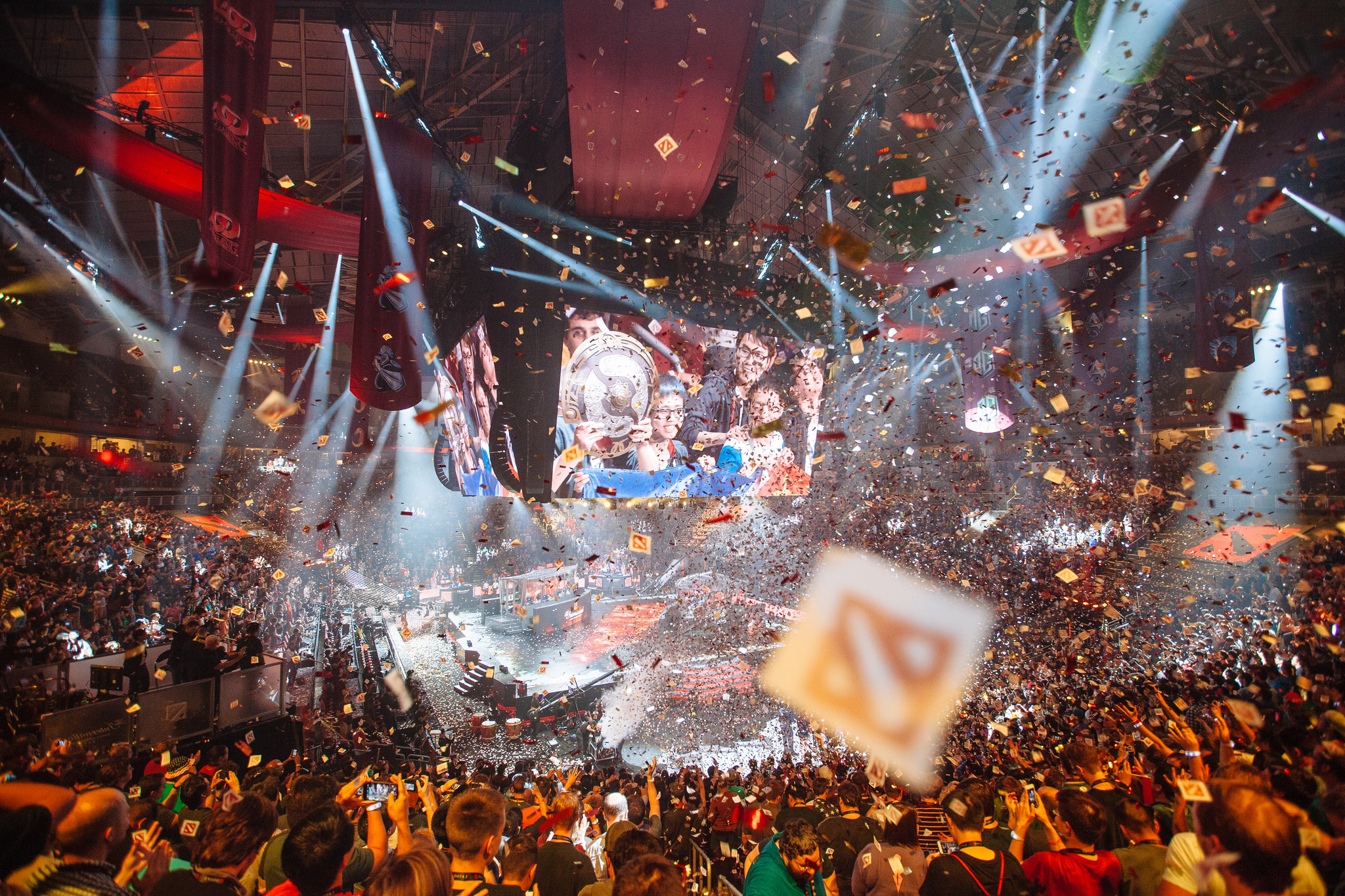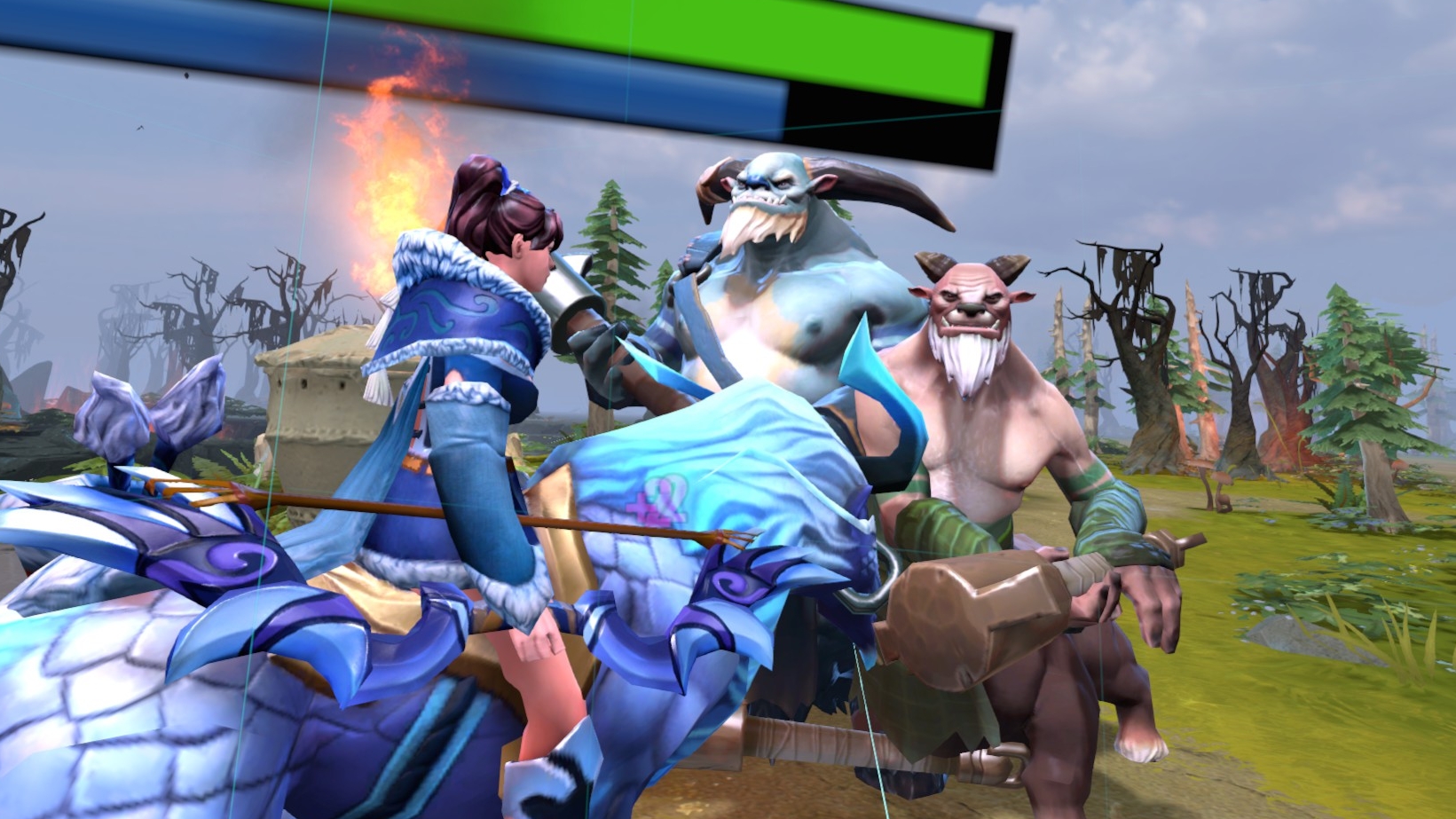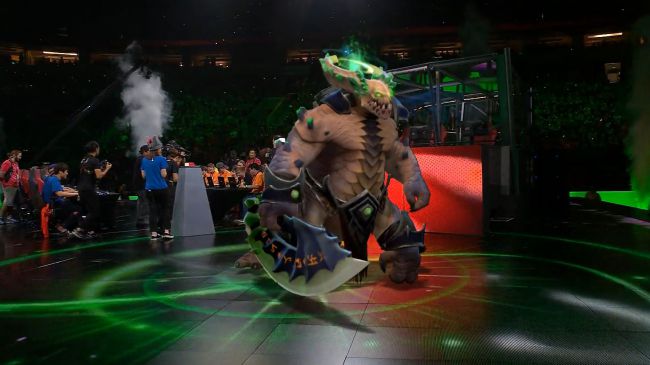Looking back on an incredible year of Dota 2
The best meta, the best International, and the biggest patch.

Over the course of Christmas and New Year, PC Gamer Pro will be exploring the moments that defined all of the biggest competitive games in 2016. Check back every day for another look back at this exciting, vibrant and growing aspect of PC gaming.
Three's the magic number. 2013 is remembered as a charmed year for Dota 2—a high watermark that each subsequent era in the game's life has been measured against. 2014 will always be the year of the eight-minute International grand final, and 2015 gave us both the $6m echo slam and the frustrating, community-fracturing relaunch of the game with the Reborn update.
With that in mind, I think 2016 might have them all beat. This was an absolutely phenomenal year for Dota 2, from the spectacle of the pro scene to the metagame to the surprises that come from Valve's 'sure let's add VR why not' attitude to ongoing development. Dota 2 has never been more dramatic, a more open field of competition, more busted (Shanghai) or more polished (Seattle). It's never been more balanced and it's never been weirder, and somewhere between those two extreme's you'll find the game's soul.
So, yeah: this might have been the single greatest year in the history of the greatest competitive videogame on the planet*. Good job, 2016.
[*Other valid options are available, and these other games will get their own 2016 roundups. But I'm the editor and it's Christmas and I'll say what I please.]
A shambles in Shanghai
There was a time when these team intros were almost the silliest thing at the Shanghai Major. It didn't last.
Just as the professional community ran out of disasters to report from late 2015's World Cyber Arena, The Shanghai Major became the first Dota 2 event to fall down and not be able to get back up.
It was a technical catastrophe, with a new production team parachuted in at the 11th hour to rescue the event at one of China's most prestigious venues. This was coupled with one of Valve's most bizarre community management snafus yet—the highly public firing of panel host James '2GD' Harding, by Gabe Newell, on Reddit.
Keep up to date with the most important stories and the best deals, as picked by the PC Gamer team.
I wrote about the controversy in greater detail at the time, but the short version is this: while Valve's disinterest in traditionally corporate, shareholder-appeasing PR management is frequently laudable, this was not the play. Valve moved against the community's wishes for good reason, but couched it in such personal language that many took it personally. It's a testament to how well they've handled almost everything else this year that Shanghai feels like such a distant memory.
It wasn't all bad. The tournament itself was great, all told, with a run of fantastic moments that demonstrated that the game itself was entering a vibrant new phase. But when managers are getting trapped in offices and Gabe's on Reddit calling someone an ass, it's easy to forget that.
Magnificence in Moscow and Manila
Things took a sharp upturn after Shanghai, however. Both Epicenter in Moscow and May and the Manila Major in June were great showings for the game from a production standpoint. The former had a dynamic stage themed after the Roshan pit and the latter had, among other things, Game of Thrones' Kristian 'Hodor' Nairn literally holding the door for OG.
Look, I never said that any of this was going to make sense.
OG's win at both events ensured that they were the team to beat going into the International 2016, and their journey from Frankfurt underdogs to the very centre of the Dota 2 establishment in only a few months is a story all to itself. There's loads more to say about this period, from the faltering rise of Korean Dota in the form of the much-loved, hyper-aggressive MVP Phoenix to Newbee's extraordinary 29-game winning streak, which was brought to a close by OG at Epicenter.
Rosterpocalypse now
Despite the introduction of a formalised roster lock system, reshuffle drama was still a major factor in the life of Dota 2 in 2016. Earlier in the year headlines were dominated by EG and Secret, whose ongoing game of musical chairs saw Aui_2000 booted from EG for the second time in a year and w33ha and Misery rendered teamless only days before Manila.
Then there's the scene-wide carnage of the post-International reshuffle, a tradition since 2014 that this year completely overhauled vast swathes of the Dota 2 landscape, from OG to Secret to Alliance and so on.
Yet in some ways the politicking of the professional community—and the waning influence of the old esports orgs in favour of player-owned teams—has given the year most of its best stories. DC's triumphant rise at the International is a Cinderella story that begins with its captain and midlaner being kicked out of Secret in March. Wings and Ad Finem both demonstrated that while the game's established elite are firing Twitlongers at each other, new talent can and will rise up to overthrow the old order.

Virtual insanity
Oh right, yeah: this was also the year that Valve added virtual reality spectating to Dota. It's both spectacular and kind of useless in practical terms, but I'm profoundly glad that it exists. I spent a weird evening sitting on the floor of my office watching Na'Vi vs. TNC from the ground level: hiding behind trees during teamfights, jumping up and down to warn Dendi of danger, and so on. It's exactly the kind of weird shit that I'd have joked about Valve adding to the game on a slow Thursday afternoon last year (in fact I did) and now it's real. Wonderful.
An incredible International
As a previous member of the 'KeyArena is never going to give us an International as good as Benaroya Hall in 2013' society, I have to respectfully admit that I was wrong. This year's main event was the best Valve have run and arguably one of the best contests in the history of the game.
Let's start with production: Valve nailed it, from the tone of the panel—which we'll get to in a second—to the stream and the stunning projection effects in the arena. They used AR to project life-size heroes onto the stage on the screens and during the analysis sections. They opened the show with Lindsey Stirling and closed it with an orchestra, first revealing Underlord and then shocking the community with the announcement of the first Dota 2-exclusive hero, Monkey King, via martial arts dance performance. Somehow, they managed to make whatever infrastructure changes were necessary to ensure that 2015's DDOS drama did not repeat itself.
It's hard to know how to sum up the tournament itself: I wrote 20,000 words about it at the time, after all. I'll start with the highlights: EHOME vs. EG, above, is the best game of professional Dota ever played. Bar none. It is the story of defending champions holding on by their fingertips for 75 long minutes. I've never been more exhausted or more elated by a videogame in any context.
Then you've got EG vs. DC, one of the best series of the year both in terms of play and the narrative that it sustains. DC were seen as a team of rejects, casualties of last-minute roster politics and either a second tier NA team or a second tier EU team depending on whether you ask a NA or EU fan. When they beat EG, the defending champions and the conquerors of EHOME, it was a statement.
DC retained a remarkable sense of fun even as their journey took them further than anyone expected. In a tournament partly notable for its remarkable meta, where only six heroes remained unpicked going into the final day, DC decided to throw caution to the wind and pick Jakiro in the lower bracket finals of the goddamn International.
This is to say nothing of Wings, the true masters of the meta (or at least, the absence of one). Their willingness to draft whatever, whenever and make it sing made them worthy champions. Standout performances by iceice and shadow closed out a phenomenal first year for this young team: last August, Wings didn't exist. Now they're world champions.
I forgot to mention TNC. Or MVP Phoenix. Look, it was a great International, okay? There's a reason it took 20,000 words last time.
Silly season
One of the accusations leveled at Valve in the aftermath of Shanghai was that the studio lacked a sense of humour: that they were set on delivering Dota with the sobriety of a golf tournament. I didn't agree with that assessment of the time—there are many different ways to be funny, and censorship-baiting gags about porn represent only one—and TI6 managed to put the matter to rest for good. They replaced the entire panel with puppets. They replaced the AR tech with a nearby cosplayer. After noting that making Purge explain games with a big touchscreen made him look like a weatherman, they doubled down.
A real sense of fun set in at Valve events this year, and it doesn't detract from the quality of the competition or the drama of those big moments.
A better meta
Thanks again to John Roberts for that amazing gif.
Back when 6.87 launched in April, I warned against the temptation to call each new patch 'the biggest patch ever'.
This was a year of the biggest patches ever.
6.87 brought substantial changes to the way stats scale and thrust Axe into the competitively limelight, as is only correct. It gave Earthshaker his wonderful Aghanim's upgrade, which I will demonstrate here:
...and arguably more importantly, it set us on the road to 6.88, which reigned in 6.87's outliers and in doing so created the most open meta that Dota 2 has ever seen. 95% of heroes picked/banned at The International is an extraordinary number, far in excess of where other MOBAs end up, and an amazing statement about the health of the game. There were issues, particularly with illusions, but damn—it's a small price to pay to see that many heroes viable, that many ways to win available to the best teams.

Give Pit Lord
They gave Pit Lord! He's now called Underlord. The final unported DotA hero arrived in Dota 2 after the International, 'finishing' Valve's port of the game after five years. In a way, I think the community was more excited about Underlord as a concept than as a hero—he's situational and rarely seen nowadays. Shouting for him was a way of shouting for any kind of update, and giving the slowing rate of Dota 2 updates that's not unreasonable.
Side note: this is actually the first year in the game's history where the rate of hero additions hasn't slowed. We got two heroes in 2015 and we got two in 2016. Whether that's enough is another debate: but at least the number is shrinking by half every year any more.
Boston makes me feel good
A refreshed assembly of freshly-reassembled Dota 2 squads headed to Boston for the year's final Major, and it was a wonderful sendoff. The rise of Greek underdogs Ad Finem is the story, here, despite the ultimate triumph of nu-OG. Like OG a year before at the Frankfurt Major, Ad Finem escaped the 'maybe' column (by way of the 'who?' column) to surprise everybody with an impressive run to the grand finals. OG were clearly the better team, in the end, but OG didn't make ODPixel make a noise like this:
(That game, the third in the grand final, is incredible, by the way. You should watch it. And it deserves the 'best game ever' declarations that it provoked. It's not the best game ever—it can't be, in a year that also included EG vs. EHOME—but the fact that crazy stuff like this just keeps happening is a testament to how healthy Dota is right now.)
Dota 3
Look, I'm going to level with you. It was very late at night when they unveiled that trailer and sometimes it just takes a montage of splash art and some version numbers to bring a single tear to a man's eye. It is a beautiful dumb journey we have all been on: a decade of Dotas whose number begins with a 6.
This month, that all changed. Dota begins with a 7 now. And it might as well be Dota 3.
This was the big announcement that Valve have been sitting on, as they are wont to do: bigger than Reborn, bigger than 6.87, bigger than that time they moved Roshan a little bit to the right. 7.00 is the real rebirth of this game: a substantially overhauled map, a new progression system, a new UI. Every player has finished the year relearning a game that they knew inside-out. It has, and will continue to have, extraordinary ramifications for the pro scene—that, I suspect, will be the story of the early months of 2017.
At the time, what struck me about the update was the fact that Monkey King is actually least interesting thing about it—and he can climb trees and morph into a banana! What strikes me now is the confidence that it represents, both on Icefrog's part and Valve's. Dota 2 was in an extremely good place. Like I keep saying, this was a phenomenal year for the game. Tweaks would probably have been fine. Reign in the few remaining outliers. Do something about illusions—that kind of thing. I think that's what other developers would have done.
Instead we got a total upheaval, a new game. This shows a profound respect for the fact that Dota 2 is ultimately about chaos, not balance. It's not meant to become a solved problem. It's supposed to be a sandbox for strategic inventiveness, virtoso technical mastery, and—frankly—really weird shit happening when all of the game's moving parts collide. Dota 2 has to keep moving to survive, and arguably the worst thing that could happen would be for Valve to think '2016 worked: let's just do that again'.
Dota 2 7.00 suggests that isn't going to happen. We're not going to get another 2016. We're going to get 2017, and honestly? If this year's taught me anything, it's not to make predictions. I've got no idea what is going to happen. I imagine a team I've never heard of will win the International and the next hero will be a big purple man. There you go. Check back next year to find out how wrong I am.
Joining in 2011, Chris made his start with PC Gamer turning beautiful trees into magazines, first as a writer and later as deputy editor. Once PCG's reluctant MMO champion , his discovery of Dota 2 in 2012 led him to much darker, stranger places. In 2015, Chris became the editor of PC Gamer Pro, overseeing our online coverage of competitive gaming and esports. He left in 2017, and can be now found making games and recording the Crate & Crowbar podcast.


